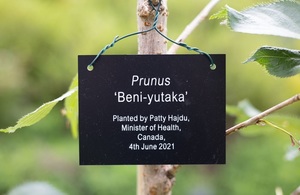Memorial trees planted in Oxford to remember lives lost around the world
Health ministers from across the world have come together in a tree-planting ceremony to remember those who have tragically lost their lives to coronavirus (COVID-19).
Health ministers from across the world have come together in a tree-planting ceremony to remember those who have tragically lost their lives to COVID-19, marking the conclusion of the G7 Health Ministers’ Meeting in Oxford today (Friday 4 June).
The Health and Social Care Secretary Matt Hancock, alongside other health leaders and a local chief nurse, planted 10 Japanese cherry (Sakura) blossom trees – one for each representative of the G7, as well as the World Health Organization and global healthcare staff – at the Oxford Botanic Garden this afternoon, complementing the garden’s already extensive collection of plants.
In Japan, the trees themselves are said to act as a metaphor for the finite nature of life.
Following the crucial UK-hosted G7 Health Ministers’ Meeting this week – which brought together health leaders from the world’s major democracies to agree life-saving action in critical areas of global health, including preventing future pandemics – the memorial acts as a timely reminder for friends and family members of loved ones they have lost.
As one of the oldest botanic gardens in the world, the Oxford Botanic Garden began as a physic garden – where healing herbs and plants are grown – in which medical students from Oxford University were taught how to identify medicinal plants in the 17th and 18th centuries.
Health and Social Care Secretary Matt Hancock said:
As I work with my G7 colleagues to better prepare us all for future health threats, we must never forget the sorrow and heartbreak felt across the UK and around the world as a result of COVID-19.
Oxford has played a central role in showing us the road out of the pandemic and their Botanic Garden now has a fitting tribute for people to be able to reflect and remember those that have been lost.
This year, the Botanic Garden celebrates the 400th anniversary of its foundation and its contribution to scientific discovery in Oxford. The garden and its arboretum at Nuneham Courtenay have been an oasis for people to enjoy during what has been a challenging 18 months.
Sam Foster, Chief Nursing Officer at Oxford University Hospitals NHS Foundation Trust, administered the first Oxford/AstraZeneca vaccine to a patient outside of clinical trials, on 4 January. She today planted a memorial tree on behalf of health and care staff around the world.
Sam Foster, Chief Nursing Officer at Oxford University Hospitals NHS Foundation Trust, said:
It is a great honour to be asked to plant a tree to remember all the dedicated nurses, doctors and other healthcare professionals who have cared for people with COVID-19 – including those who have lost their lives during the pandemic.
We must never forget the contribution which every member of health and care staff has made during this time of unprecedented challenges for the NHS and globally.
The 2021 G7 Health Ministers’ Meeting has been held in person at Oxford University – a global centre of clinical, scientific and academic excellence – which has been at the heart of the global fight against COVID-19, with world-leading clinical trials and its not-for-profit partnership with AstraZeneca on COVID-19 vaccines already saving thousands of lives across the globe.
The meeting took place over 2 days and provided a valuable opportunity to discuss global health security, antimicrobial resistance, clinical trials and digital health, as well as live issues. Engagement also took place virtually with the G7 Presidency’s guest countries: Republic of India, Republic of Korea, Australia and Republic of South Africa.
The Health Ministers’ Meeting precedes and informs health discussions at the Leaders’ Summit, hosted by the Prime Minister on 11 to 13 June.
Professor Louise Richardson, Vice Chancellor of the University of Oxford, said:
Oxford University is honoured to have hosted the Health Ministers and is very grateful for this gesture of commemoration for those who have lost their lives. Planting beautiful trees in our ancient Botanic Garden is a powerful affirmation of the health-giving properties of nature itself and will be a source of reflection for generations to come.

